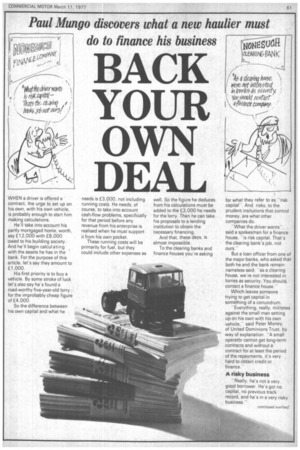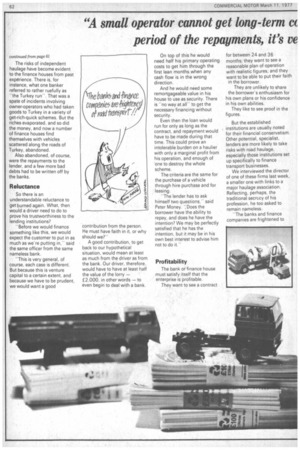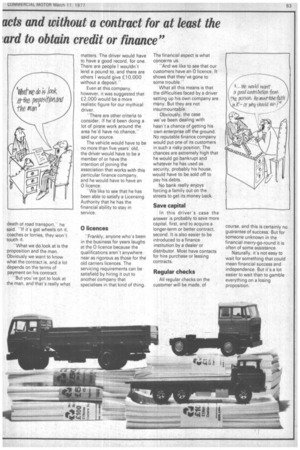WHEN a driver is offered a contract, the urge to
Page 65

Page 66

Page 67

If you've noticed an error in this article please click here to report it so we can fix it.
set up on his own, with his own vehicle, is probably enough to start him making calculations.
He'll take into account his partly mortgaged home, worth, say £12,000 with £8,000 owed to his building society. And he'll begin calculating with the assets he has in the bank. For the purpose of this article, let's say they amount to £1,000.
His first priority is to buy a vehicle. By some stroke of luck let's also say he's found a road-worthy five-year-old lorry for the improbably cheap figure of £4,000.
So the difference between his own capital and what he needs is £3,000, not including running costs. He needs, of course, to take into account cash-flow problems, specifically for that period before any revenue from his enterprise is realised when he must support it from his own pocket.
These running costs will be primarily for fuel, but they could include other expenses as well. So the figure he deduces from his calculations must be added to the £3,000 he needs for the lorry. Then he can take his proposals to a lending institution to obtain the necessary financing.
Arid that, these days, is almost impossible.
To the clearing banks and finance houses you're asking for what they refer to as "risk capital". And risks, to the prudent insitutions that control money, are what other companies do.
"What the driver wants-, said a spokesman for a finance house, "is risk capital. That's the clearing bank's job, not ours.'
But a loan officer from one of the major banks, who asked that both he and the bank remain nameless said: "as a clearing house, we're not interested in lorries as security. You should. contact a finance house."
Which leaves someone trying to get capital in something of a conundrum.
-Everything, really, militates against the small man setting up on his own with his own vehicle," said Peter Money, of United Dominions Trust, by way of explanation. "A small operatbr cannot get long-term contracts and without a
contract for at least the period of the repayments, it's very hard to obtain credit or finance...
A risky business
"Really, he's not a very good borrower. He's got no capital, no previous track record, and he's in a very risky business." The risks of independent haulage have become evident to the finance houses from past experience. There is, for instance, what one banker referred to rather ruefully as "the Turkey run". That was a spate of incidents involving owner-operators who had taken goods to Turkey in a variety of get-rich-quick schemes. But the riches evaporated, and so did the money, and now a number of finance houses find themselves with vehicles scattered along the roads of Turkey, abandoned.
Also abandoned, of course, were the repayments to the lender, and a few more bad debts had to be written off by the banks.
Reluctance
So there is an _understandable reluctance to get burned again. What, then would a driver need to do to prove his trustworthiness to the lending institutions?
"Before we would finance something like this, we would expect the customer to put in as much as we're putting in," said the same officer from the same nameless bank.
"This is very general, of course, each case is different. But because this is venture capital to a certain extent, and because we have to be prudent, we would want a good contribution from the person. He must have faith in it, or why should we?"
A good contribution, to get back to our hypothetical situation, would mean at least as much from the driver as from the bank. Our driver, therefore, would have to have at least half the value of the lorry — £2.000, in other words — to even begin to deal with a bank. On top of this he would need half his primary operating costs to get him through the first lean months when any cash flow is in the wrong direction.
And he would need some remortgageable value in his house to use as security. There is ''no way at all" to get the necessary financing without security.
Even then the loan would run for only as long as the contract, and repayment would have to be made during that time. This could prove an intolerable burden on a haulier with only a marginal profit from his operation, and enough of one to destroy the whole scheme.
The criteria are the same for the purchase of a vehicle through hire purchase and for leasing.
"The lender has to ask himself two questions," said Peter Money. ':Does the borrower have the ability to repay, and does he have the intention? We may be perfectly satisfied that he has the intention, but it may be in his own best interest to advise him not to do it."
Profitability
The bank or finance house must satisfy itself that the enterprise is profitable.
They want to see a contract for between 24 and 36 months; they want to see a reasonable plan of operation with realistic figures; and they want to be able to put their faith in the borrower.
They are unlikely to share the borrower's enthusiasm for his own plans or his confidence in his own abilities.
They like to see proof in the figures.
But the established institutions are usually noted for their financial conservatism. Other potential, specialist, lenders are more likely to take risks with road haulage, especially those institutions set up specifically to finance transport businesses.
We interviewed the director of one of these firms last week, a smaller one with links to a major haulage association. Reflecting, perhaps, the traditional secrecy of his profession, he too asked to remain nameless.
-The banks and finance companies are frightened to death of road transport, he said. -If it's got wheels on it, coaches or lorries, they won't touch it.
"What we do look at is the proposition and the man. Obviously we want to know what the contract is, and a lot depends on the terms of payment on his contract.
-But you've got to look at the man, and that's really what
matters. The driver would have to have a good record, for one. There are people I wouldn't lend a pound to, and there are others I would give £10,000 without a deposit."
Even at this company, however, it was suggested that £2,000 would be a more realistic figure for our mythical driver.
-There are other criteria to consider. If he'd been doing a lot of pirate work around the area he'd have no chance," said our source.
The vehicle would have to be no more than five years' old, the driver would have to be a member of or have the intention of joining the association that works with this particular finance company, and he would have to have an 0 licence.
-We like to see that he has been able to satisfy a Licensing Authority that he has the financial ability to stay in service.
0 licences
"Frankly, anyone who's been in the business for years laughs at the 0 licence because the qualifications aren't anywhere near as rigorous as those for the old carriers licences. The servicing requirements can be satisfield by hiring it out to another company that specialises in that kind of thing. The financial aspect is what concerns us.
"And we like to see that our customers have an 0 licence. It shows that they've gone to some trouble.
What all this means is that the difficulties faced by a driver setting up his own company are many. But they are not insurmountable.
Obviously, the case we've been dealing with hasn't a chance of getting his own enterprise off the ground. No reputable finance company would put one of its customers in such a risky position. The chances are extremely high that he would go bankrupt and whatever he has used as security, probably his house, would have to be sold off to pay his debts.
No bank really enjoys forcing a family out on the streets to get its money back.
Save capital
In this driver's case the answer is probably to save more capital, first, and to acquire a longer-term or better contract, second. It is also easier to be introduced to a finance institution by a dealer or distributor, Most have contacts for hire purchase or leasing contracts.
Regular checks
All regular checks on the customer will be made, of course, and this is certainly no guarantee of success. But for someone unknown in the financial merry-go-round it is often of some assistance.
Naturally, its not easy to wait for something that could mean financial success and independence. But it's a lot easier to wait than to gamble everything on a losing proposition.






















































































































